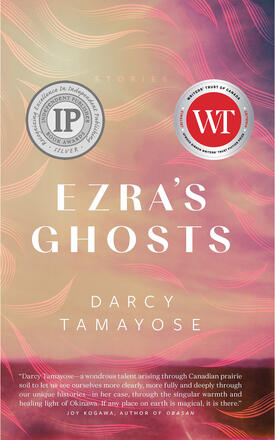
Ezra's Ghosts
Stories
Description
Award-winning author Darcy Tamayose returns with Ezra's Ghosts, a collection of fantastical stories linked by a complex mingling of language and culture, as well as a deep understanding of grief and what it makes of us. Within these pages a scholar writes home from the Ryukyu islands, not knowing that his hometown will soon face a deadly calamity of its own. Another seeker of truth is trapped in Ezra after her violent death, and must watch how her family--and her killer--alter in her absence. The oldest man in town, an immigrant who came to Canada to escape imperial hardships, sprouts wings, and a wounded journalist bears witness to his transformation. Finally, past and present collide as a researcher reflects on the recent skinwars that have completely altered the world's topography. Binding the stories together is an intersection of arrival and departure--in a quiet prairie town called Ezra.
Reviews
Praise for Ezra's Ghosts:
"[a]n immersive and intelligent page turner.... this is a treasure."
~Publishers Weekly
Praise for Odori:
"Tamayose's prose brims with lyrical display ... We're offered fevid reminders of nature's beauty every few pages ... Odori is finally a war novel, its point to seek meaning amid chaos, to show the exquisite and eternal amid the blood and brutality and death. Yet where Tamayose truly excels, where her writing seizes you (well, me) in mind and heart, is where mortal truths insist on breaking through her gauzy curtain."
~The Globe and Mail
"Odori, Darcy Tamayose's debut novel, brings to mind initial works by such celebrated Alberta authors as Thomas Wharton (Icefields), Peter Oliva (Drowning in Darkness) and Hiromi Goto (Chorus of Mushrooms) ... Odori is an audacious, multi-layered debut ... Nothing would may this long-time reader of Alberta fiction happier than to see Tamayose gain a vast readership."
~Alberta Views
"[A] sprawling, poetic and ambitious debut novel ... Odori is fascinating ... It's clear Tamayose has a gift for creating a sense of place."
~The Edmonton Journal
"Has all the ingredients of a good book - suspense, drama, love, loss, the ties that bind, gifts handed down from one generation to the next and how they can be lost in war ... The gift of the storyteller runs through Tamayose's veins and I expect to see more works in the future. I look forward to reading them."
~The Lethbridge Herald